As a guinea pig owner, it’s essential to ensure that your furry friend’s dietary needs are met. One common question that arises is whether or not canned corn is a suitable food option for guinea pigs.
Before incorporating canned corn into your pet’s diet, it’s crucial to consider the potential risks and expert advice from veterinarians.
In this section, we will explore the safety and suitability of canned corn for guinea pigs and provide expert advice from professionals in the field.
Key Takeaways:
- Feeding canned corn to guinea pigs can have potential risks due to its high sugar and sodium content.
- Understanding a guinea pig’s specific dietary requirements will help you provide them with a diet that is both healthy and balanced.
- There are numerous alternatives available to canned corn that are safer and healthier for your guinea pig to consume.
- Always consult with your veterinarian to ensure that your guinea pig is receiving a well-rounded diet.
Understanding Guinea Pig’s Diet Requirements
Guinea pigs are herbivores, meaning they require a diet primarily composed of plant-based foods. A guinea pig’s diet should consist of hay, fresh vegetables, and high-quality pellets.
The Role of Hay
Hay is an essential component of a guinea pig’s diet. Timothy hay is recommended as it aids digestion, provides necessary fiber, and helps to prevent overgrown teeth. Unlimited access to hay should be provided to your guinea pig at all times.
Fresh Vegetables
Fresh vegetables are also crucial for a healthy guinea pig diet. The consumption of vegetables contributes to a well-rounded diet. Vegetables high in vitamin C, such as kale and bell peppers, are particularly important for guinea pigs, as they cannot produce this vitamin on their own.
High-Quality Pellets
High-quality pellets should make up a small portion of a guinea pig’s diet. When choosing pellets, select those that are high in fiber, contain vitamin C, and don’t include added sugars or artificial colors. Pellets should be offered in small amounts to avoid overconsumption.
By providing your guinea pig with a well-balanced diet consisting of hay, fresh vegetables, and high-quality pellets, you can help ensure that your pet remains healthy and happy.
Nutritional Value of Canned Corn
When it comes to the nutritional value of canned corn, it is important to note that it varies depending on the brand and specific product. Generally, canned corn contains a substantial amount of carbohydrates, which can provide energy to your guinea pig. Additionally, it contains a small amount of protein and fiber.
In terms of vitamins, canned corn is a decent source of B vitamins, such as thiamin and niacin. However, it is relatively low in vitamin C and other essential vitamins and minerals that guinea pigs require in their diet.
Overall, canned corn should not be relied upon as a primary source of nutrition for your guinea pig. Instead, focus on offering a variety of fresh vegetables that contain a wider range of essential vitamins and minerals that are crucial for your guinea pig’s health and well-being.
Potential Risks of Feeding Canned Corn to Guinea Pigs
While canned corn may be a convenient snack to offer your guinea pig, it comes with potential risks and drawbacks. The high sodium content in canned corn can lead to health concerns in guinea pigs, including kidney damage and high blood pressure. Additionally, the high sugar content in canned corn can contribute to obesity, dental problems, and even diabetes in your furry friend.
It’s important to note that canned corn may also contain preservatives and additives that can be harmful to guinea pigs. It’s best to avoid feeding your pet any canned food, including canned corn. If you’re unsure about the safety of a specific food, it’s always best to consult with your veterinarian before offering it to your guinea pig.
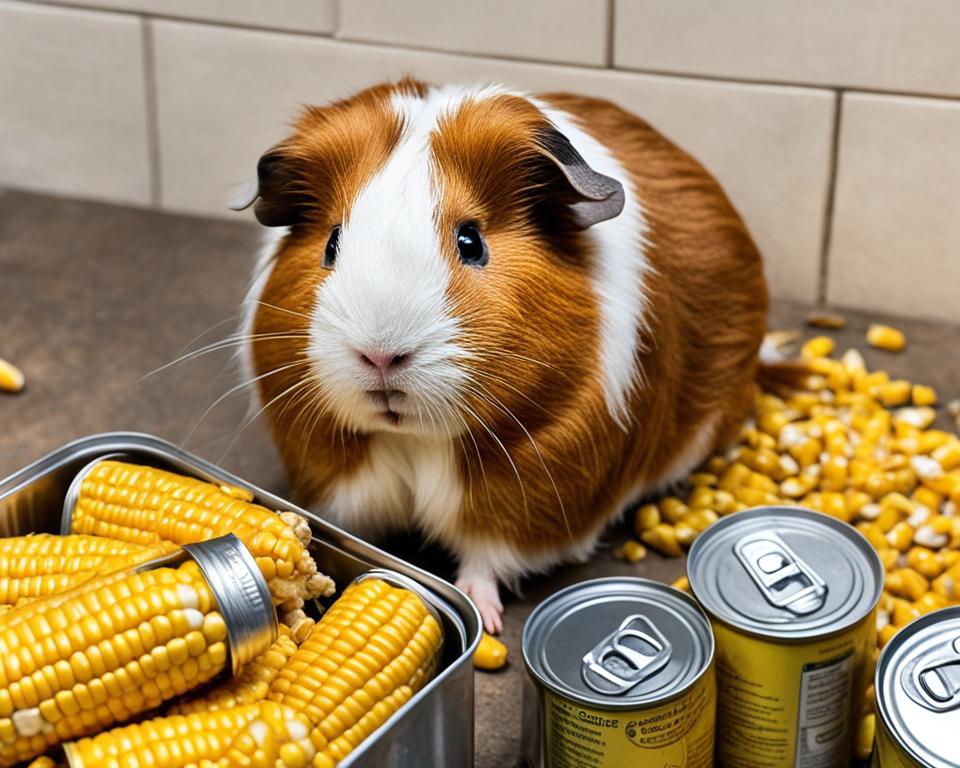
Instead of canned corn, consider offering your guinea pig a variety of fresh vegetables, such as carrots, bell peppers, and leafy greens. These foods are lower in sodium and sugar and provide vital nutrients to keep your pet healthy. Always introduce new foods to your guinea pig’s diet gradually and monitor for any adverse reactions.
Expert Opinion: Can Guinea Pigs Eat Canned Corn?
When it comes to deciding whether or not guinea pigs can eat canned corn, it’s always best to seek expert opinion from veterinarians. Most veterinarians advise against feeding canned corn to guinea pigs due to the high sugar and salt content, which can lead to health problems such as obesity and hypertension.
Furthermore, canned corn may contain preservatives that can be harmful to your pet’s digestive system. While canned corn may seem like a convenient and easy snack option for your guinea pig, it’s important to prioritize their health and well-being by offering them a balanced and nutritious diet.
Instead of canned corn, consider offering your guinea pig a variety of fresh vegetables and fruits, such as carrots, cucumber, and bell peppers. These options provide a range of essential vitamins and minerals that are crucial for your guinea pig’s health. Always consult with your veterinarian to ensure your guinea pig’s specific dietary needs are being met and to address any concerns.
Alternatives to Canned Corn for Guinea Pigs
If you’re looking for a healthy and safe alternative to canned corn, there are plenty of options available that are more suitable for your guinea pig’s consumption. Below are some suggestions:
- Fresh vegetables: A variety of fresh veggies, including bell peppers, cucumber, carrots, and kale, provide your guinea pig with essential nutrients and fiber.
- Hay: Timothy hay and alfalfa hay are vital components of a guinea pig’s diet, providing necessary fiber and promoting dental health.
- Pellets: High-quality pellets made specifically for guinea pigs provide vital nutrients and vitamins that promote overall health.
- Fruit: While higher in sugar, small amounts of fresh fruit can be a tasty treat for your guinea pig. Options include strawberries, blueberries, and apples.
Remember to always introduce new foods gradually and monitor your guinea pig for any adverse reactions. These alternatives can provide your furry friend with a well-rounded, nutritious diet without the potential risks associated with canned corn.
Introducing New Foods to Guinea Pigs
If you’re looking to add variety to your guinea pig’s diet, introducing new foods is a great way to do so. However, proper introduction is crucial to maintain your pet’s health. Guinea pigs, like humans, have different taste preferences, and may take some time to adjust to new foods.
Gradual Transition
The introduction of new foods should be gradual to avoid any gastrointestinal upset. Start by introducing small amounts of the new food alongside their regular diet. Over time, gradually increase the new food and decrease the amount of their old food until they are only eating the new food.
Monitoring for Adverse Reactions
It’s essential to monitor your guinea pig for any adverse reactions to the new food, such as diarrhea or a decrease in appetite. If any adverse reactions are observed, stop the new food and consult your veterinarian.
Safe New Foods for Guinea Pigs
Some safe and healthy new foods to introduce to your guinea pig’s diet include fresh herbs like parsley and cilantro, bell peppers, and leafy greens like kale and spinach. Always research a new food before offering it to your pet to ensure it is safe for consumption.
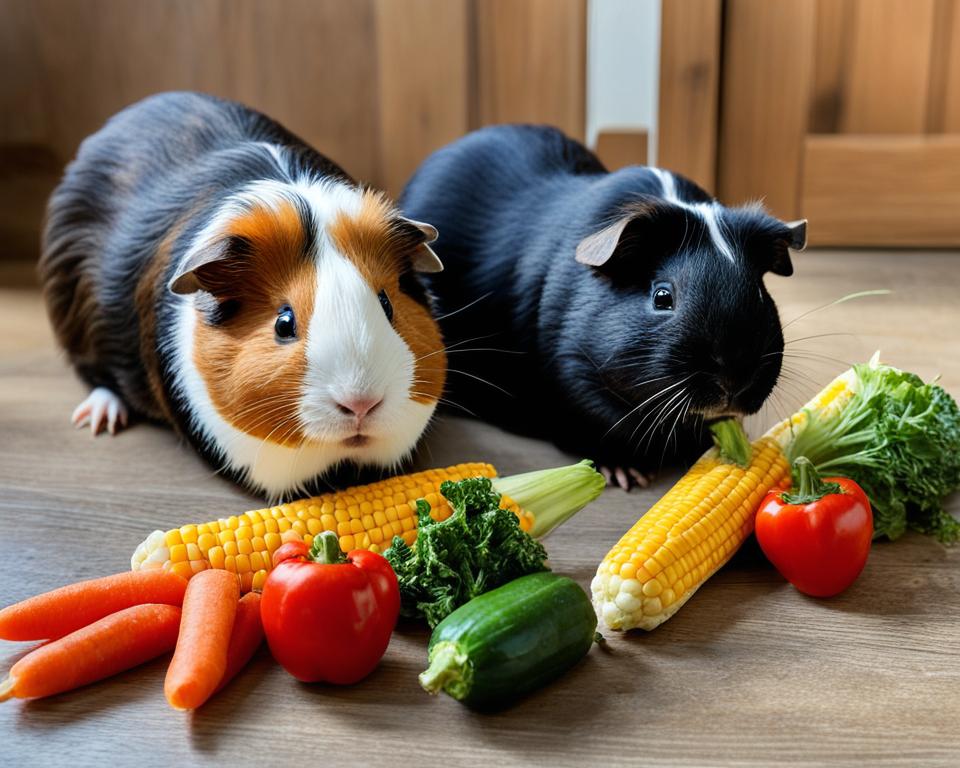
Introducing new foods to your guinea pig’s diet can be an exciting way to keep mealtime interesting. By following a gradual transition and monitoring for adverse reactions, you can ensure your pet stays healthy while exploring new tastes and textures.
How to Serve Vegetables to Guinea Pigs
Vegetables are an important part of a guinea pig’s diet, but they must be served in the right way to ensure optimal nutrition and safety. Here are some guidelines to follow:
- Always wash vegetables thoroughly to remove dirt and pesticides.
- Cut vegetables into small, bite-sized pieces to prevent choking.
- Introduce new vegetables gradually to avoid digestive upset.
- Rotate vegetable options to provide a variety of nutrients and prevent boredom.
- Avoid serving vegetables that are high in oxalic acid, such as spinach and kale, in excess as they can interfere with calcium absorption.
- Offer vegetables that are high in vitamin C, such as bell peppers and broccoli, to meet a guinea pig’s dietary requirements.
Remember to monitor your guinea pig for any signs of digestive upset or adverse reactions to new vegetables. Always consult with your veterinarian for specific advice on serving vegetables to your guinea pig.
Signs of Nutritional Imbalance in Guinea Pigs
Guinea pigs require a balanced diet for healthy growth and development. A lack of essential nutrients or an overabundance of certain foods can lead to nutritional imbalances and potential health issues. Here are some common signs to watch out for:
- Loss of appetite: A sudden disinterest in food or refusal to eat may indicate a nutritional imbalance.
- Weight loss or gain: Fluctuations in weight can be a sign that your guinea pig is not getting the right balance of nutrients.
- Dull, thinning coat: A poor diet can lead to a dull, thinning coat or even patches of hair loss.
- Lethargy: Guinea pigs with a nutritional imbalance may seem sluggish or uninterested in activities they usually enjoy.
- Digestive problems: Diarrhea, constipation, or other digestive issues may be a sign of an improper diet.
It is important to note that other medical conditions can also cause these symptoms, so it is best to consult with your veterinarian if you notice any of these signs in your guinea pig.
Conclusion
After considering all the factors, it is best to avoid feeding canned corn to your guinea pig. While it is a popular snack for humans, it can be harmful to your furry friend due to its high sugar and salt content. Instead, focus on providing a balanced diet that includes hay, fresh vegetables, and high-quality pellets. It is also important to consult with your veterinarian for specific dietary recommendations for your guinea pig.
Remember, introducing new foods to your guinea pig’s diet requires patience and attention, so be sure to follow the guidelines for proper food introduction and monitor for any adverse reactions. Signs of nutritional imbalance can include weight loss, lethargy, and abnormal stool. Be proactive in ensuring your guinea pig’s diet is nutritionally balanced to maintain their health and happiness.
Overall, feeding your guinea pig a diet that aligns with their specific nutritional needs is essential to their overall well-being. While canned corn may seem like a convenient snack option, it is not worth risking your pet’s health. Choose healthier alternatives and consult with your veterinarian for a tailored dietary plan for your beloved guinea pig.
FAQ
Can guinea pigs eat canned corn?
It is not recommended to feed guinea pigs canned corn. While corn itself is safe for guinea pigs in small quantities, canned corn often contains high levels of sodium and sugar, which can be harmful to their health.
What are the dietary requirements of guinea pigs?
Guinea pigs require a diet that consists of fresh hay, fresh vegetables, and high-quality pellets. These components provide the necessary nutrients, fiber, and dental wear for their overall health and well-being.
What is the nutritional value of canned corn?
Canned corn is a source of carbohydrates and some vitamins, but it may lack the necessary fiber and other nutrients that guinea pigs need in their diet. Allowing guinea pigs to consume excessive canned corn can lead to nutritional imbalances.
Are there any risks in feeding canned corn to guinea pigs?
Yes, there are potential risks in feeding canned corn to guinea pigs. Canned corn often contains high levels of sodium and sugar, which can negatively affect their health. It is best to avoid canned corn and opt for healthier alternatives.
What do veterinarians say about guinea pigs eating canned corn?
Veterinarians generally advise against feeding canned corn to guinea pigs due to its high sodium and sugar content. While small amounts of fresh corn can be given as a treat, canned corn should be avoided for their overall health.
What are some alternatives to canned corn for guinea pigs?
There are several healthy alternatives to canned corn that you can offer to your guinea pigs. Some suitable options include fresh vegetables like bell peppers, cucumbers, and leafy greens, along with occasional fruits such as apples and berries.
How should I introduce new foods to my guinea pig?
When introducing new foods to your guinea pig, it is important to do so gradually. Start by offering a small amount and monitor for any adverse reactions. Slowly increase the quantity over time to allow their digestive system to adjust.
What is the proper way to serve vegetables to guinea pigs?
Vegetables should be served fresh, washed thoroughly, and cut into small, bite-sized pieces. Avoid giving them frozen or cooked vegetables. Introduce new vegetables slowly and ensure they are free of pesticides or other harmful substances.
What are the signs of nutritional imbalance in guinea pigs?
Signs of nutritional imbalance in guinea pigs may include weight changes, dental problems, digestive issues, hair loss, and a weakened immune system. It is crucial to provide a balanced and varied diet to prevent these issues.
Can I feed guinea pigs canned corn occasionally?
It is generally recommended to avoid feeding guinea pigs canned corn altogether due to its high sodium and sugar content. Opting for healthier alternatives and consulting with a veterinarian regarding your guinea pig’s dietary needs is advised.

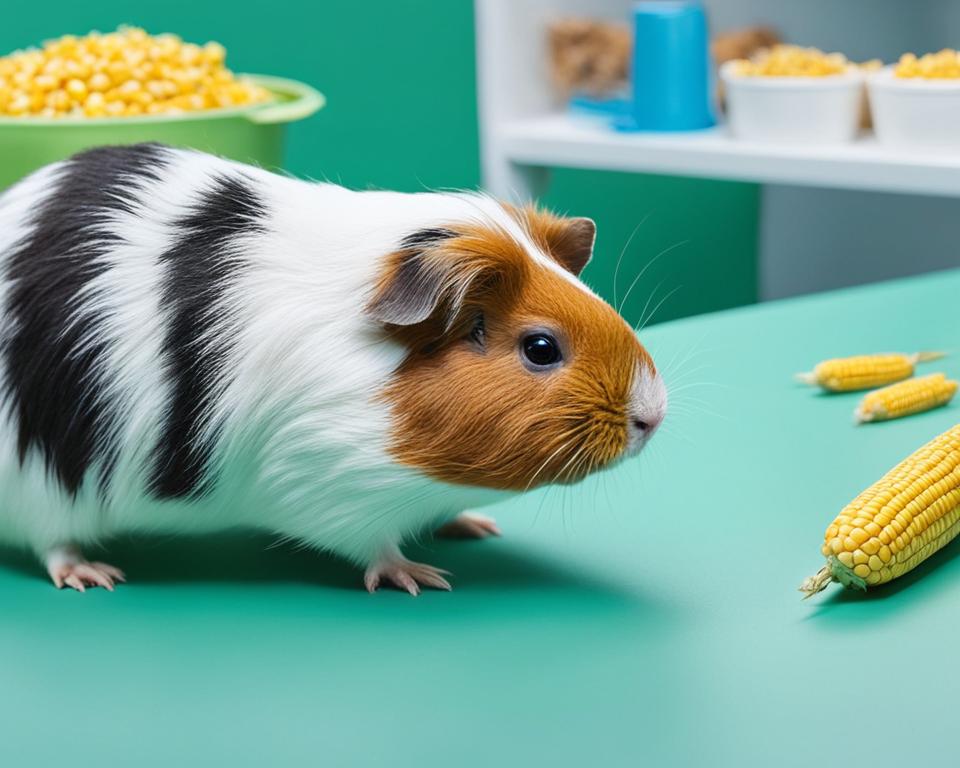
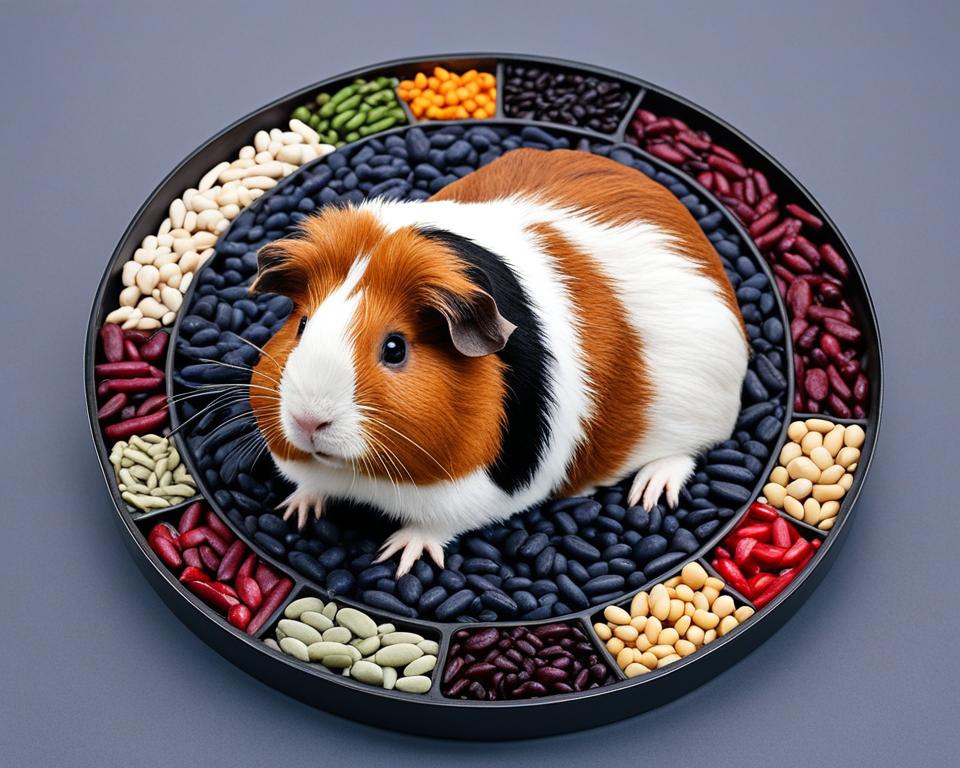
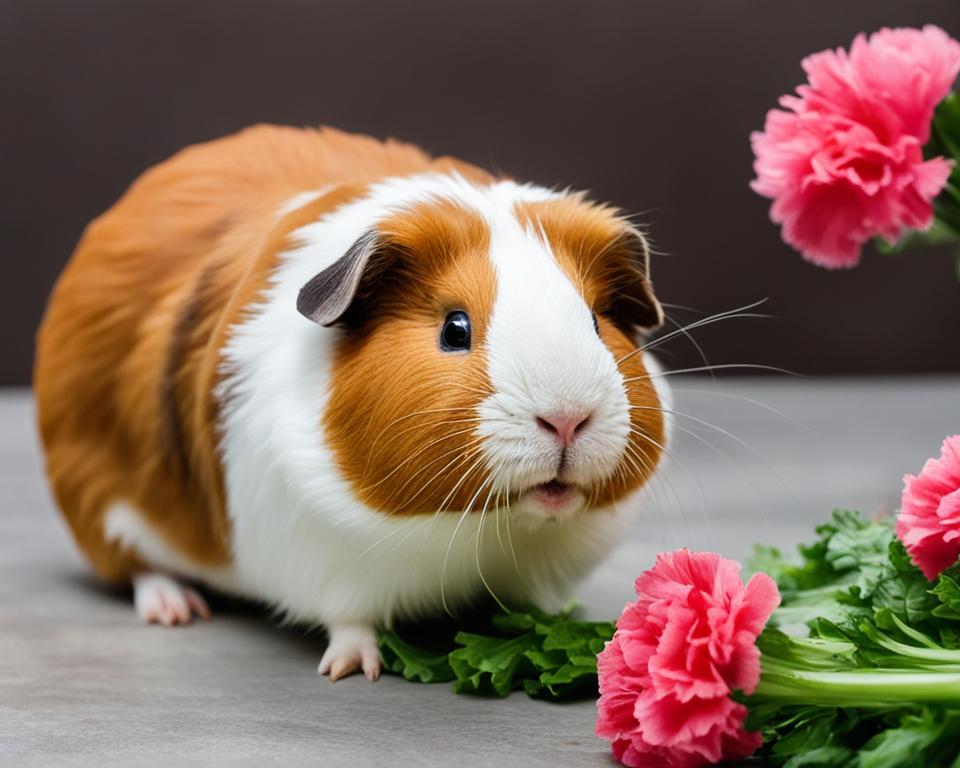
Leave a Reply